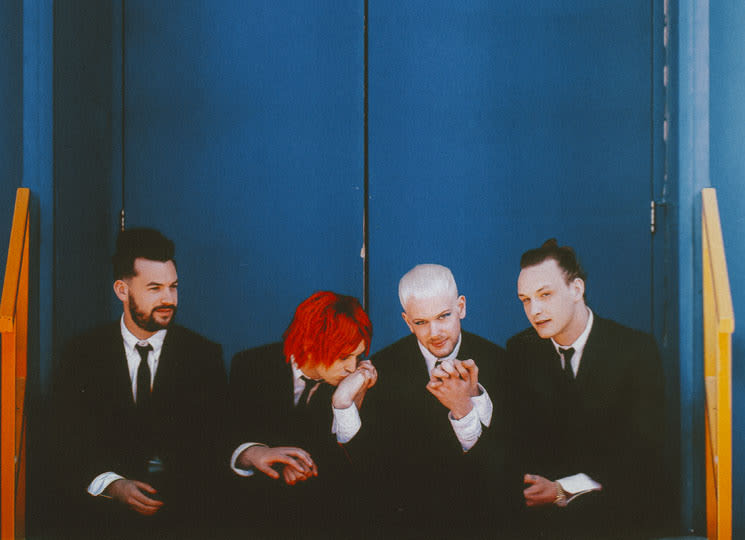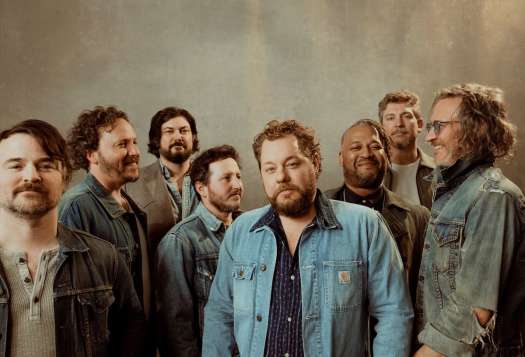A lot of artists can thank the internet for their career, but few embrace it as wholeheartedly as a total aesthetic as the 1975. From lead singer and self-described "modernist" Matty Healy's steady stream of self-aware cultural references, to the band's ability fuse together the shattered fragments of pop's past and make songs that sound like its future, they, and by extension their music, live perpetually in the moment, always with an eye to what's next.
So it should come as no surprise that when it came time for the English quartet to make their third album, A Brief Inquiry Into Online Relationships, life online became a running theme. "If you write about relationships now, and how they are mediated, you kind of start making a record about the internet by proxy, because it's such a total experience," says Healy. "The online experience is the human experience."
It's a record "defined by the asking of questions," but Healy freely admits that it comes up short on answers. Yet, where previously an ironic quip might have undermined the weight of those queries, Healy embraced conviction and sincerity best exemplified on "Love It If We Made It," a state-of-the-now anthem that skirts parody thanks to Healy's impassioned delivery. "People say that it sounds like quite a bold record. I don't think it's striving to be bold. I think it's like trying to avoid being bored."
A Brief Inquiry is just the first of two records the group plan on releasing over the next six months. For our interview, Healy was calling from a studio an hour-and-a-half outside of London, where work is in full swing on what is at this point being called Notes on a Conditional Form. When it's released in May, it will mark the end of a two-year creative cycle during which the band will have lived with the constant pressure of having a record to finish. Not that Healy seems all that bothered by that.
"I'm a songwriter. This is how I negotiate with the world," he says bluntly. "I can't make one record considering what my music consumption and sensibility is like, you know? We all consume music so fast. The idea of wanting to do what I want to do live, culturally and stuff, I just don't feel like I can do that with one record. There are a lot of ideas going on at the moment."
But any hope of realizing those ideas — and the progress the band had made in America, where previous album, I Love It When You Sleep For You Are So Beautiful Yet So Unaware of It, hit #1 — was put into jeopardy in the fall of 2017 when Healy, who'd become addicted to smoking heroin, headed to a rehab facility in Barbados. It was no easy pill to swallow for someone who'd spent their career playing with the idea of rock star clichés. "I just learned that I needed to grow up," he says. "I wanted to do something that was kind of bigger than, you know, just sedating myself."
With the support of his bandmates, family and girlfriend, Australian actor Gabriella Brooks, he emerged relatively unscathed and with a newfound sense of purpose. Partners in tow, the band — guitarist Adam Hann, bass player Ross MacDonald, and drummer George Daniel — decamped from London and set to it, working six days a week. When they weren't writing and recording, they were working out in preparation for the tour that would accompany the album's release. "Everything that wasn't the pursuit of excellence for the record kind of went away, and that included delicious opiates," he says. "We went from this almost theatrical kind of breakup to kind of wanting to make, like, five records."
"It's Not Living (If It's Not With You)" most directly references his time in rehab ("Collapse my veins wearing beautiful shoes") but it's "I Couldn't Be More In Love," on which Healy expresses his fears of throwing it all away, that gets to the heart of the crisis he had put himself — and the band — in.
What the band consciously avoided was taking a single batch of songs and spreading them across two records. Rather, they wanted "a multitude of different expressions" on both records, as opposed to one on each. As such, all the songs on Notes were written after A Brief Inquiry was completed. "If you've got a song that you want to save, that's proof that you can write a good song," he says. "You can't make the thing that you're working on worse so you can make something that doesn't even exist yet a little bit better. Make that thing fucking amazing and then make the other thing fucking amazing. Just keep writing songs."
So it should come as no surprise that when it came time for the English quartet to make their third album, A Brief Inquiry Into Online Relationships, life online became a running theme. "If you write about relationships now, and how they are mediated, you kind of start making a record about the internet by proxy, because it's such a total experience," says Healy. "The online experience is the human experience."
It's a record "defined by the asking of questions," but Healy freely admits that it comes up short on answers. Yet, where previously an ironic quip might have undermined the weight of those queries, Healy embraced conviction and sincerity best exemplified on "Love It If We Made It," a state-of-the-now anthem that skirts parody thanks to Healy's impassioned delivery. "People say that it sounds like quite a bold record. I don't think it's striving to be bold. I think it's like trying to avoid being bored."
A Brief Inquiry is just the first of two records the group plan on releasing over the next six months. For our interview, Healy was calling from a studio an hour-and-a-half outside of London, where work is in full swing on what is at this point being called Notes on a Conditional Form. When it's released in May, it will mark the end of a two-year creative cycle during which the band will have lived with the constant pressure of having a record to finish. Not that Healy seems all that bothered by that.
"I'm a songwriter. This is how I negotiate with the world," he says bluntly. "I can't make one record considering what my music consumption and sensibility is like, you know? We all consume music so fast. The idea of wanting to do what I want to do live, culturally and stuff, I just don't feel like I can do that with one record. There are a lot of ideas going on at the moment."
But any hope of realizing those ideas — and the progress the band had made in America, where previous album, I Love It When You Sleep For You Are So Beautiful Yet So Unaware of It, hit #1 — was put into jeopardy in the fall of 2017 when Healy, who'd become addicted to smoking heroin, headed to a rehab facility in Barbados. It was no easy pill to swallow for someone who'd spent their career playing with the idea of rock star clichés. "I just learned that I needed to grow up," he says. "I wanted to do something that was kind of bigger than, you know, just sedating myself."
With the support of his bandmates, family and girlfriend, Australian actor Gabriella Brooks, he emerged relatively unscathed and with a newfound sense of purpose. Partners in tow, the band — guitarist Adam Hann, bass player Ross MacDonald, and drummer George Daniel — decamped from London and set to it, working six days a week. When they weren't writing and recording, they were working out in preparation for the tour that would accompany the album's release. "Everything that wasn't the pursuit of excellence for the record kind of went away, and that included delicious opiates," he says. "We went from this almost theatrical kind of breakup to kind of wanting to make, like, five records."
"It's Not Living (If It's Not With You)" most directly references his time in rehab ("Collapse my veins wearing beautiful shoes") but it's "I Couldn't Be More In Love," on which Healy expresses his fears of throwing it all away, that gets to the heart of the crisis he had put himself — and the band — in.
What the band consciously avoided was taking a single batch of songs and spreading them across two records. Rather, they wanted "a multitude of different expressions" on both records, as opposed to one on each. As such, all the songs on Notes were written after A Brief Inquiry was completed. "If you've got a song that you want to save, that's proof that you can write a good song," he says. "You can't make the thing that you're working on worse so you can make something that doesn't even exist yet a little bit better. Make that thing fucking amazing and then make the other thing fucking amazing. Just keep writing songs."




